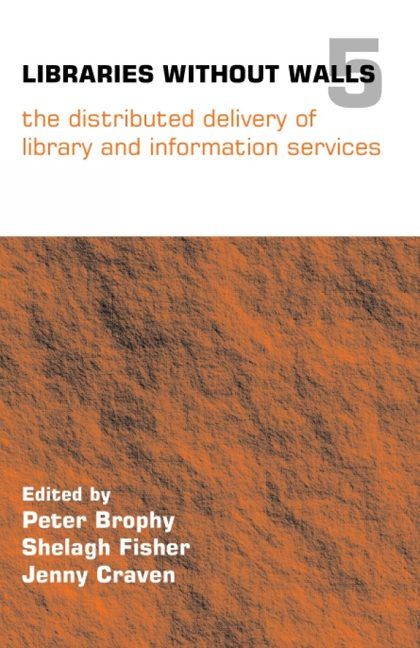Book contents
- Frontmatter
- Contents
- Contributors
- 1 Introduction
- 2 Keynote paper: beyond the mainstream of library services
- THEME 1 THE INTEGRATION OF LIBRARY SERVICES AND VIRTUAL LEARNING ENVIRONMENTS
- THEME 2 THE RELATIONSHIP BETWEEN USER NEEDS, INFORMATION SKILLS AND INFORMATION LITERACIES
- THEME 3 USABILITY AND ACCESSIBILITY OF DIGITAL LIBRARY SERVICES
- THEME 4 DESIGNING THE INFORMATION ENVIRONMENT: NATIONAL AND INSTITUTIONAL PERSPECTIVES
- THEME 5 THE CREATION OF DIGITAL RESOURCES BY USER COMMUNITIES
- Index
- Miscellaneous Endmatter
- Miscellaneous Endmatter
- misc-endmatter
- Miscellaneous Endmatter
1 - Introduction
Published online by Cambridge University Press: 08 June 2018
- Frontmatter
- Contents
- Contributors
- 1 Introduction
- 2 Keynote paper: beyond the mainstream of library services
- THEME 1 THE INTEGRATION OF LIBRARY SERVICES AND VIRTUAL LEARNING ENVIRONMENTS
- THEME 2 THE RELATIONSHIP BETWEEN USER NEEDS, INFORMATION SKILLS AND INFORMATION LITERACIES
- THEME 3 USABILITY AND ACCESSIBILITY OF DIGITAL LIBRARY SERVICES
- THEME 4 DESIGNING THE INFORMATION ENVIRONMENT: NATIONAL AND INSTITUTIONAL PERSPECTIVES
- THEME 5 THE CREATION OF DIGITAL RESOURCES BY USER COMMUNITIES
- Index
- Miscellaneous Endmatter
- Miscellaneous Endmatter
- misc-endmatter
- Miscellaneous Endmatter
Summary
The fifth Libraries Without Walls (LWW5) conference was held in Lesvos, Greece, from 19 to 23 September 2003. It continued the tradition of the LWW conferences by bringing together international perspectives on the delivery of library and information services to users who are not in the physical library. When the first LWW conference was held in 1995, the focus was primarily on distance learning and geographical dispersion. Since then, however, rapid advances in the development of information and communications technologies (ICTs) based infrastructures and services have led to a situation where many library users now routinely access services remotely – even when ‘remotely' means ‘within sight of the library building’. As a previous conference attendee observed, ‘we are all distance learners now’. LWW5 was concerned with innovative ways of delivering library and information services in this new environment
In his keynote paper (‘Beyond the Mainstream’, Chapter 2) Peter Brophy reflected on the focus of the LWW conferences since 1995 when the first LWW conference was held to disseminate findings of the BIBDEL project in which three university libraries had worked together to explore the delivery of library and information services ‘at a distance’ through the use of information technology (Irving and Butters, 1996). Brophy noted that in the second LWW conference held in 1997 (Brophy, Fisher and Clarke, 1998) the remote delivery of information services was a subject that had seen rapid growth as an area of specialist interest, so that by the third conference (Brophy, Fisher and Clarke, 2000) the topic had moved into the mainstream of information service delivery and, by the fourth conference (Brophy, Fisher and Clarke, 2002) in 2001 the topic was actually driving the mainstream. In his paper Brophy raised critical questions about the notion of the ‘library’ as an appropriate construct and about the need to develop a new model of ‘libraries without walls’.
Subsequent papers that were delivered at the conference all contributed in some way to addressing these questions by articulating the findings of new research and the evaluation of novel practices in remote delivery in the context of education and lifelong learning.
- Type
- Chapter
- Information
- Libraries Without Walls 5The Distributed Delivery of Library and Information Services, pp. 1 - 6Publisher: FacetPrint publication year: 2004

